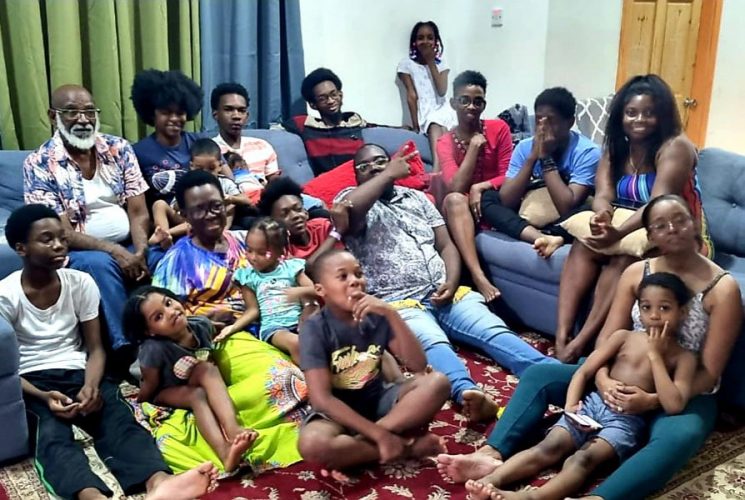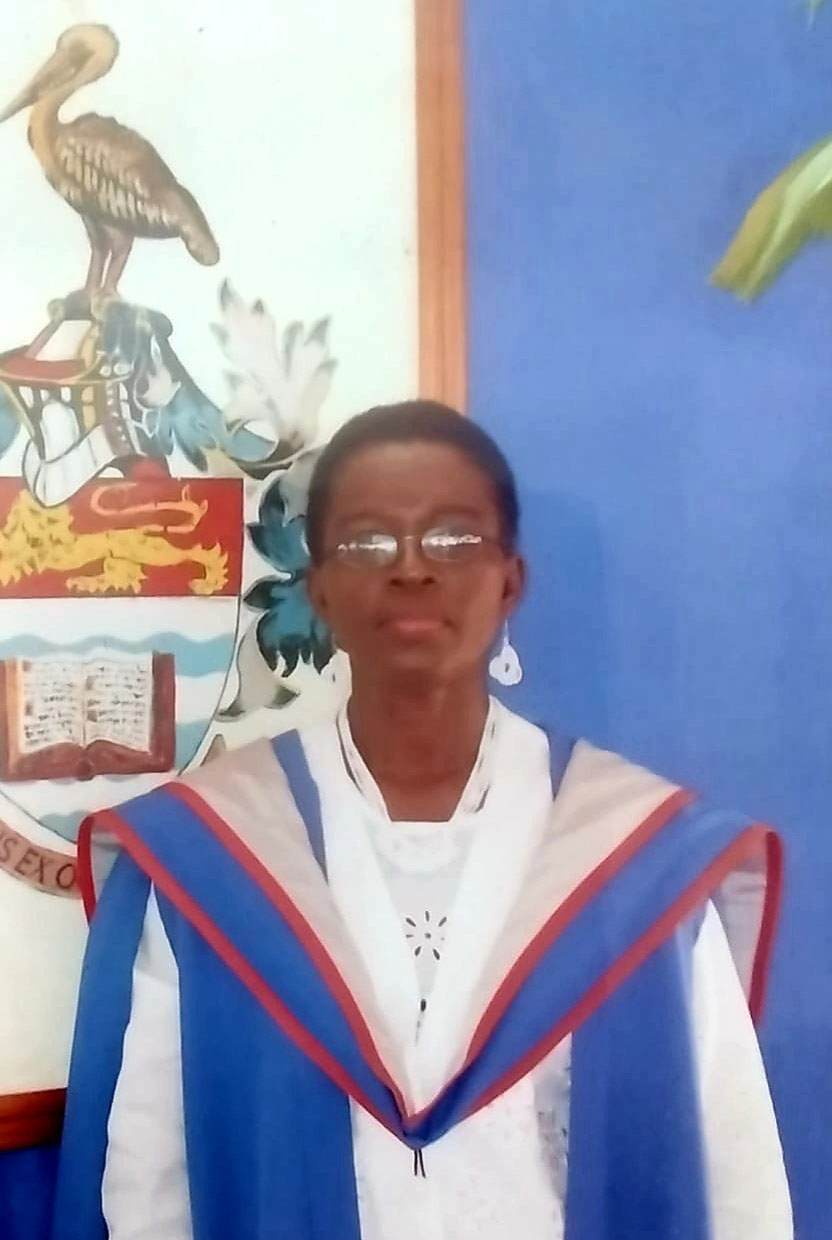Retired civil engineer Agnes Dalrymple earned the title ‘Iron Lady’ for her no-nonsense approach to any lack of discipline in the predominantly male-dominated workforce she headed, and particularly in the sea defence area where she fought for funding to ensure the safety of people’s lives and infrastructure.
“As a woman in a male-dominated field I had to stand my ground because the men believed they could walk over me. For example, I supervised a drainage and irrigation (D&I) project on the West Bank Demerara where the only women in the unit were myself, the secretary and the cleaner. In the field there was no woman. The men tried all kinds of things to sabotage my work. They didn’t think I’d go in the mud. In those days the hydraulics division had responsibility for both the sea defences and drainage and irrigation,” she told Stabroek Weekend.
She recalled the 1980s when rehabilitation of the D&I system in the Canals Polder was being done and she had to visit the sites to ensure the work was done according to specifications.

“Some of these works were in the backdam and some of the operators were excavating the perpendicular channels. Sometimes when you passed in a vehicle you saw the excavator bucket in mid-air as if it was doing work. On investigating, I found the operator was either sleeping or he was away on his own business. The serviceman working with him would try to cover up for the operator and many times I had to pull them up,” she stated
In 1992 the D&I division was incorporated into the Ministry of Agriculture.
Iron Lady
When it was payday the men collected their salaries and headed to a nearby rum shop to imbibe instead of going to work, Dalrymple recalled. “I’d go to the rum shop. By the time they got a glimpse of me, they disappeared. In the rum shop, I’d see rum and glasses on the table but no one drinking,” she said
She recalled that there was a high rate of pilfering on the job. “I let the police sort out the issues and the level of pilfering reduced. They realised this lady wasn’t easy and so I got the name Iron Lady. It didn’t bother me. I gained the respect among my male peers,” she noted.
In 1983, she was posted to Region Six (East Berbice/Corentyne) to work with a team on the pumps in Black Bush Project. She spent a year and a half in Region Six and took along her children. Her husband stayed at home in Stewartville where they had moved to in 1982.
She also worked in Region Two and at Leguan and Wakenaam in Region Three as well as at Rosignol in Region Five where she was in charge of the projects.
“Whenever I had to leave the family my husband was very supportive and a source of strength,” she said.
Her husband, Norman Dalrymple, holds a doctorate in theology and is a minister of the gospel. On two occasions she was in the Netherlands on training courses. The first time it was for a two-week course in cartography in digitised form in 1998.
She returned to the Netherlands in 2003 to do a three-month geographical information systems (GIS) training course as part of an institutional capacity building programme funded by the European Development Fund.
She obtained her diploma and bachelor’s degree in civil engineering from the University of Guyana and her master’s degree in construction management from the University of the West Indies. The UWI courses were conducted in Guyana between 2006 and 2009.
By that time, she was heading the Sea Defence Unit.
“That was a time when we had a lot of breaches in the sea defence system. Sections of the seawalls were collapsing,” she recalled
When she took over that unit, she said, she had a lot of cleaning up to do. “When I saw the cleaning I had to do, I deliberately didn’t make any friends in the unit. Another senior engineer subsequently commended me for the clean-up I did there. He said no one wanted to do it.
“When the finance guy, God rest his soul, recognised that I got more work done with the money released than before I took over, I had no problem going to the Ministry of Finance to get releases for my projects,” she said
Walking the seawalls
Dalrymple walked the seawalls along the Essequibo Coast, Leguan, Wakenaam, West Coast Demerara and from Georgetown to Mahaica with engineer Rovin Bhookmohan to see firsthand the state of the sea defence system, while also doing some technical work along the way.
“That walk enabled us to make some informed decisions. We knew the sea defence methods used; what was being protected in specific areas. We faced the elements. It was a lot of detailed work because we also had to get some information for Lands and Surveys. In that way we knew what the sea defence looked like and where to make interventions depending on priority. For instance, Georgetown is high priority because it is the seat of government,” she noted.
Securing budgetary allocations was another issue.
“Once, I remember I didn’t get funding for four or five areas that required attention. I never took them off the programme. Every time I went to a budget release meeting, I was told there was no money for those projects. I always argued that I knew the condition of the seawalls and should anything happen I won’t take responsibility because I have it on the programme. You know by August/September that year we had money for those projects.”
She headed the emergency unit from 2004 and the Sea Defence Unit from 2007 until April 2010. She worked for 32 years in the public service.
After retiring from government service, Dalrymple, who is now 69 years old, took a 15-month vacation and travelled. “It was refreshing and I was reinvigorated after years of lots of responsibilities,” she said.
Reflecting on the things she has done, she thanked God for seeing her through the years. She got onto Facebook and reconnected with relatives, friends and colleagues she had not been in touch with for years. “It was like Wow. I played catch up,” she said.
After her extended vacation she joined a private company where she was exposed to other construction works. “I enjoyed it but there again I had to stand my ground. The administrative and technical staff knew me well. The contractors knew of my reputation at the ministry before I joined the company,” she noted. She represented the company at a meeting in Japan.
After retiring from the private sector she decided to take things easier. “I believe that life has phases. Like Ecclesiastes 3:1 says, ‘There is an appointed time for everything, and a time for every affair under the heavens.’ I have had a good life in engineering. I have children, grandchildren and great grandchildren. It is so nice reading the bible to them. They make life more meaningful. I can reminisce with them and now pass on some of my knowledge to them,” she said.
While working in the private sector she also obtained a bachelor’s degree in theology through the Guyana chapter of the Florida-based Life Christian University. On Tuesdays and Wednesdays, she reaches out to women in the community and encourages them to be active and shows them how the gospel could aid in their situation. She quoted Titus 2:3 as saying that aged women should set examples for the behaviour of the young and teach them what is good.
Groundings
Dalrymple was born at Hague, West Coast Demerara and moved with her family to Den Amstel in the early 1960s. She attended Den Amstel Primary and West Demerara Secondary schools. She
successfully wrote the College of Preceptors examinations followed by the General Certificate of Education Ordinary Levels examinations.
The fourth child of ten siblings, her father died when she was nine years old but before he died he ensured his older children knew the value of education. Her mother was also strict with their schoolwork.
After her father died her secondary education was taken care of partially by his brother, who was a superintendent of police, and a cousin on the West Bank Demerara.
“In those days we caught the train from Den Amstel to Vreed en Hoop and walked from Vreed en Hoop to Pouderoyen on the West Bank Demerara and walked back to catch the train in the afternoons,” she recalled.
“Village life was lots of fun. We had a lot of fruit trees in the yard. Mangoes, sapodillas, cherries, coconut trees. Dad planted a farm in Den Amstel backdam. We had rice lands and he planted ground provisions. We had a kitchen garden at home. We also had livestock – pigs, goats, cows. We had ducks and fowls.”
After her father died, Dalrymple assisted to babysit her younger siblings. “They called me the nurse. I had an aunt who said I wasn’t going to get children because of my attention to the younger ones but I gave birth to six children,” she said.
One of her sons died but the others are all university graduates; one has a PhD in civil engineering, and three others have master’s degrees.
After leaving school Dalrymple joined the Black Showcase Cultural Group, which was also an educational group at Den Amstel. “We had resource persons who taught members who hadn’t completed school, various skills so some young people were able to pick up pieces of their lives. That was where I met my husband,” she said. Growing up she learnt to sew and make handbags using different materials including the discarded bags in which potatoes were imported.
“So I had an income even before I started working with the government. In the village was a seamstress who I befriended. I observed how she made clothes. I started sewing my school skirts. Then I started sewing for my siblings. I loved sewing for little girls, the frills, the flounces and the laces. I sold them. I sewed clothes and school uniforms for my children. I even experimented with shirts and made dashikis for the Black Showcase members. I sewed for my husband,” she said.
After she had her first child at 19 years, having obtained a diploma in architecture from the Government Technical Institute (GTI), she started working in April 1976 in the drawing office as a trainee draughtsman in the then Hydraulics Division of the Ministry of Public Works. In two months, she was promoted to assistant draughtsman and she was one of four women in a male dominated office.
After that she did the Building, Mechanical and Technical Drawing I and II diplomas at GTI.
“My responsibilities were always my family, work and study,” she noted.





